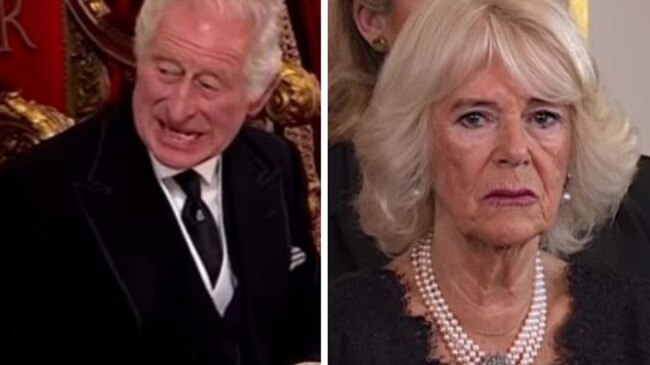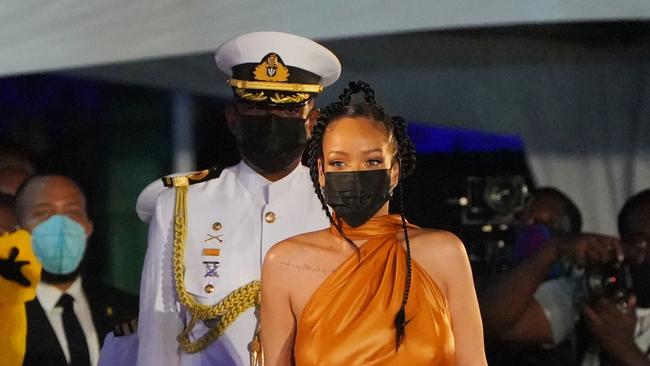Antigua and Barbuda joins growing list of nations plotting to abandon the monarchy after Queen’s death
He’s only just become king – but Charles is already staring down a major threat to his reign just days after Queen Elizabeth’s death.

Leaders
Don't miss out on the headlines from Leaders. Followed categories will be added to My News.
Antigua and Barbuda has joined the growing list of nations planning to turn their backs on the monarchy in the wake of Queen Elizabeth’s death after 70 years on the throne.
Immediately after confirming King Charles III as the King of Antigua and Barbuda over the weekend, Prime Minister Gaston Browne told ITV News a referendum would be held within three years to determine whether the Caribbean nation would become a republic.
“This is a matter that has to be taken to a referendum for the people to decide,” he said.
“This is not an act of hostility, or any difference between Antigua and Barbuda and the monarchy.”
He added that it would be “a final step to complete the circle of independence to become a truly sovereign nation” and that it did not “represent any form of disrespect to the monarch”.

However, it is far from an isolated case, with a string of countries now poised to abandon King Charles.
Last November, the Caribbean island nation of Barbados became the world’s latest republic after officially removing Queen Elizabeth as its head of state, following in the footsteps of Mauritius, which did the same back in 1992.
The Queen was also removed as head of state in Guyana, Trinidad and Tobago and Dominica in the 1970s, and Fiji in 1987.
Stream your news live & on demand with Flash. From CNN International, Al Jazeera, Sky News, BBC World, CNBC & more. New to Flash? Try 1 month free. Offer ends 31 October, 2022 >

The government of neighbouring Jamaica has also announced plans to transition towards a republic in 2025.
And here in Australia, the republican movement has also seen a renewed push in recent years, with the cause getting a major boost with the election of Prime Minister Anthony Albanese, who appointed MP Matt Thistlethwaite to the new role of Assistant Minister the Republic.
So what does it all mean for the future of the Commonwealth, and for King Charles’ reign?
Republican movement spreads
There are now 54 member states of the Commonwealth, but just 15 of those still have the monarch as their head of state.
They include Australia, Antigua and Barbuda, Belize, Canada, Grenada, Jamaica, New Zealand, Papua New Guinea, St Kitts and Nevis, St Lucia, St Vincent and the Grenadines, Solomon Islands, The Bahamas and Tuvalu and the UK.

The republican movement appears to be especially strong in the Caribbean, with the Bahamas’ former attorney general Sean McWeeney stating last year that it was “inevitable” the nation would follow Barbados’ lead.
Also last year, Belize’s Minister Constitutional and Political Reform, Henry Charles Usher, reportedly told parliament: “Perhaps it is time for Belize to take the next step in truly owning our independence. But it is a matter that the people of Belize must decide on.”
Meanwhile, Mikael Phillips, an opposition member of Jamaica’s parliament, said on Thursday local time he believed the death of Queen Elizabeth could hasten the transition to a republic.
“I am hoping as the Prime Minister had said in one of his expressions, that he would move faster when there is a new monarch in place,” Mr Phillips said.
King Charles III is now head of state in 14 countries outside the UK — a legacy of British colonization.
— AJ+ (@ajplus) September 8, 2022
But some have indicated plans to cut those ties:
In Jamaica, officials have said they plan to become a republic and seek $10 billion in reparations for the slave trade. pic.twitter.com/pBcCbxjxDH
And St Lucia’s leader of the opposition, Allen Chastanet, told Reuters he supported the “general” movement towards a republic in his country.
The mood within the Caribbean was also on display back in March when Prince William and his wife Catherine toured Belize, Jamaica and the Bahamas and were met with protests and calls for slavery reparation payments.
‘An issue for the Australian people’
Meanwhile, the Australian Republic Movement paid tribute to Queen Elizabeth immediately after her death, but argued it was now time for Australia to take the next step towards full independence.
“The Queen backed the right of Australians to become a fully independent nation during the referendum on an Australian republic in 1999, saying that she has ‘always made it clear that the future of the monarchy in Australia is an issue for the Australian people and them alone to decide, by democratic and constitutional means’,” the organisation said in a statement last week.

The Albanese government has also committed to exploring the option of becoming a republic in its second term, with staunch republican and Assistant Minister for the Republic Matt Thistlethwaite telling A Current Affair earlier this year that “many Australians now believe that the time is right”.
“We will begin the discussion during this term and hopefully, if that is successful, we can look to move towards an Australian head of state in our second and hopefully third terms of government,” Mr Thistlethwaite said.

Over the weekend, the PM – himself a republican – told Sky News UK that he had invited Prince Charles to visit Australia “as soon as possible” and that now was not the time to reignite the republic debate.
He confirmed that out of “deep respect and admiration” for the Queen, he would not “pursue questions about our constitution” unless he was re-elected for a second term.
Mr Albanese also told the ABC’s Insiders program that “now was not a time to talk about our system of government”.
“That’s the system of government that we have, it’s one which as Australian Prime Minister, I have a responsibility to respect,’’ he said.
“Quite clearly, this is a time of national mourning.
“Even though the Queen was 96 years of age and had lived such a long life, it still came as a shock. I think that says something about the way that the Queen was perceived as a constant in our lives.”
Originally published as Antigua and Barbuda joins growing list of nations plotting to abandon the monarchy after Queen’s death





